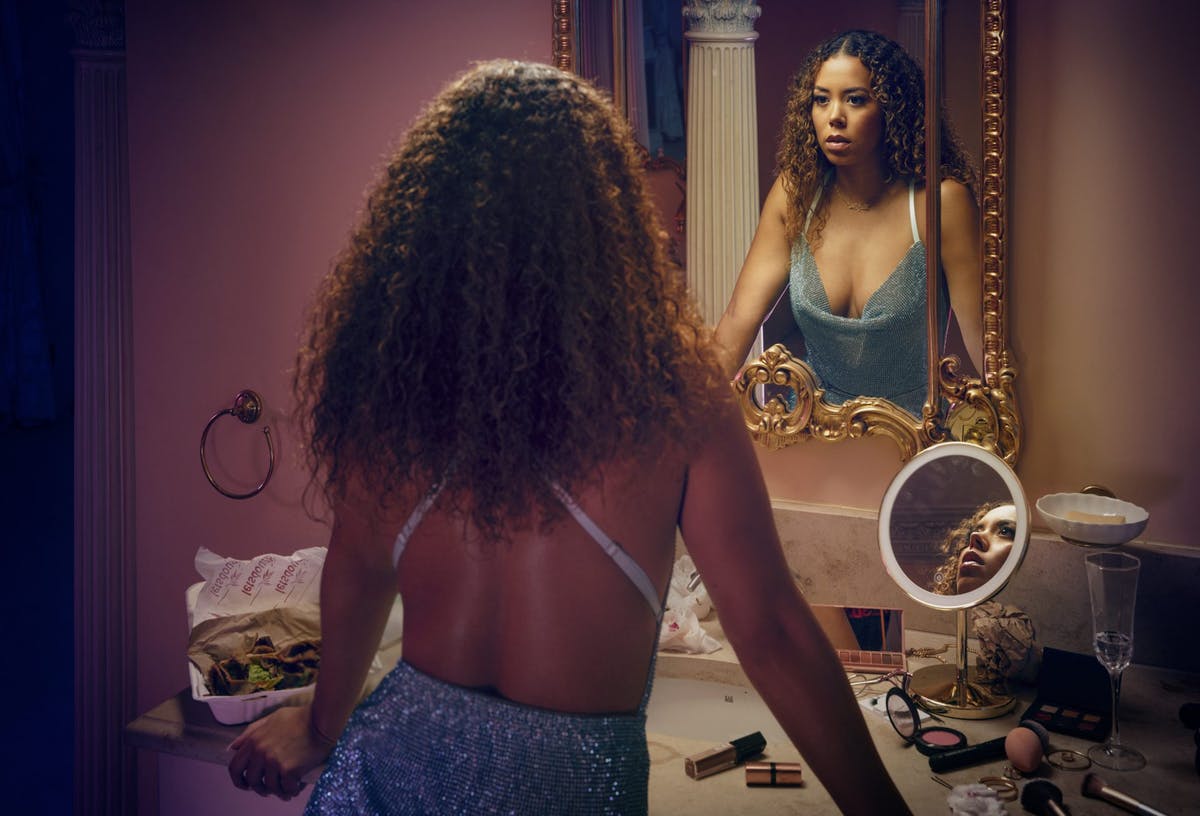Nicôle Lecky’s Mood is a musical exploration of being broke and misunderstood on OnlyFans
Talking East London accents, sex work shaming and not diluting herself with the brain behind BBC Three's powerful new show.
Precious Adesina
11 Mar 2022

BBC
Over the past few years, there has been ever-growing interest in how sex workers use social media. In 2018, Tumblr banned sexually explicit content, which saw traffic to the site plummet by 40% in three years alongside widespread criticism online. The pandemic also forced more of them to do their jobs virtually, which coincided with the rise of internet content subscription services such as OnlyFans. Now, the new show Mood on BBC Three, adapted from the one-woman stage play Superhoe, sheds an unbiased light on the life of sex workers through the lens of social media influence.
In Mood, 25-year-old Sasha, portrayed by Nicôle Lecky, spends her days smoking weed, stalking her ex-boyfriend and trying (and failing) to make it as a singer. But, when she is kicked out of her family home and living with her friend (who is also a local drug dealer experiencing psychosis) falls through, she moves in with Carly, a social media influencer. The northern firebrand exposes Sasha to a seemingly glamorous lifestyle, offering to show the east Londoner how to make it big online. But, the world Sasha becomes a part of ends up being far more complicated and emotionally taxing than what she had originally envisaged.

“[The show] is presenting a slice of the life of what some would say is quite a troubled young woman,” Nicôle says of her character Sasha. Initially named Superhoe, after the play she wrote and starred in at the Royal Court Theatre in London in 2019, Mood joins a roster of noteworthy TV shows that were adapted from plays starring the woman who wrote them. Like Michaela Coel’s Chewing Gum or Phoebe Waller-Bridge’s Fleabag. “I’d like people to watch it and see an authentic portrayal of what a lot of young women are facing today.”
Talking to Nicôle on Zoom on a Thursday afternoon, I’m surprised by her demeanour which is noticeably different from the person she plays on the show. Having watched Mood, the tough exterior Sasha has had to develop to cope with her difficult surroundings makes it hard to sympathise for the protagonist. “She doesn’t have the kind of opportunities afforded to her in the same way that someone with rich parents or even parents who have access to the [entertainment] industry may have,” the actress explains. Nicôle and Sasha have that lack of privilege in common, however. “I had to figure things out and have ended up here through grafting. We have different spirits, but I think she’s ambitious, though maybe doesn’t believe in herself as much.”
Nicôle and Sasha are also both from east London, though it would be wrong to assume that the show or the play is about Nicôle’s life, even if it’s clear that some of her own personal experiences growing up in Stratford and those of the people surrounding her inform the story.
“Racism is alive and well on these forums”
The idea for Superhoe came to Nicôle after someone showed her a website that men used to shame sex workers. “These men put them up on this website and claim they are doing it as a public service. Really it’s just to shame and embarrass these women. It’s gross,” she says in disgust. “They find women on social media who say they are models, singers, actresses, or whatever and they go, ‘look, this person’s not really a model or a singer, she’s actually a secret sex worker,” she says. While she was initially interested in who the men were, she quickly realised that they already had a platform. Instead, she interviewed dozens of women involved in online sex work to create her play.
“These are very hardworking and successful women,” she says. “I look at their social media and I go, ‘they look like they’re living these amazing lives’. I wanted to find out the story behind it: are they actually living their best lives? Are they really empowered? Are they being exploited?”
Nicôle points out that those who watched Superhoe in the theatre three years ago shouldn’t expect Mood to be identical to it. She says the TV series has progressed to be in line with the internet savvy world we live in today. “When I wrote Superhoe it was cam work, but when I wrote Mood there was a huge boom in sites like OnlyFans. It felt like that was the natural kind of progression to contemporise it,” Nicôle says. There are also flashbacks of Sashas’s ex who doesn’t appear in the original, though he also still doesn’t have a physical presence in any scenes set ‘in the present’. “I was like ‘there’s no reason why this man should be in her life because he has ghosted her’. She’s told him something [he wasn’t happy with], though we don’t really know what it is. He [represents] the misogyny that I think many women experience growing up, especially in their teenage years.”
But, a lot of Sasha will stay true to the original, especially aspects associated with her working-class roots. “It was really important to me that her accent was the same in the play and on TV. I know some people watching it may not understand her all the time because she speaks really quickly with an East London accent, but that kind of authenticity had to stay the same.” Nicôle adds jokingly, though quite authoritatively, that if people struggle to understand Sasha then they can turn on subtitles.
It was critical for Nicôle that the show wasn’t diluted for the small screen, not even though it’s on the BBC. “I wasn’t going to censor it,” she says, emphasising that she was very clear on her vision. “I wasn’t going to censor the explicitness. It had to be as real as I wanted it to be other than those fantasy moments.” By “fantasy moments”, Nicôle is talking about the scenes in the show where characters break out into song and dance. Most poignantly is a moment when Sasha is at a local Job Centre asking for help after her mum kicks her out. The man behind the counter sings “don’t blame us, you’re a lazy cunt. You think you deserve everything”. Eventually, the entire room of people waiting for their benefits and/or some form of help break out into song culminating in them singing the same lines back to the workers. “The thing I want to be taken away from the show is that it feels like somebody like me wrote it and not some random privileged white man,” Nicôle says.
Nicôle is successful in doing just that, most apparently in the relationships Sasha has with her friends and family. In the family dynamic, we see, that mixed-race Sasha is the only non-white person, and it’s clear that she’s ill at ease in their presence. “She feels like she doesn’t really belong and that’s important to how she manoeuvres within that space,” Nicôle explains. “I was quite fortunate in that my Jamaican heritage is quite strong in my family (and also I have an equal kinship with my black side and my white side) so I felt quite whole.” But Nicôle knows mixed-race people who weren’t given the opportunity to know both sides of their heritage, particularly their black side. “It can be hard for people. I think Sasha is dealing with that, especially the more she gets into the world of sex work, which is very racialized and fetishized.”
There’s a scene where Carly, who is white, suggests Sasha’s online name on a website hilariously called DailyFans should be ‘LexiCaramel’, which Sasha is noticeably uncomfortable with. “When I was researching it, it was all really icky. You go online and mixed-race girls are called toffee, caramel or whatever, and black girls are called something like chocolata. It’s all about your race in a way that it isn’t for white women, then it’s more brown or blonde hair.” Nicôle found that race was even an issue with white sex workers and their clients. “I saw a lot of white sex workers saying they ‘will not have meetings with black men’ and they put it in their profile. Racism is alive and well on these forums.”
The fuel for the storyline of the show is that sense of being a part of (or not being a part of) something bigger than just yourself. That’s what makes Mood so powerful. “I think belonging is really important and it’s looked at across the show really. She didn’t belong in that space [with her family] and then she’s sofa surfing in act two. That’s me talking about that hidden homelessness of young people now.”
There’s a lot to unpack in Nicôle’s six-part series but most importantly it gives a raw, multifaceted and extremely nuanced view into how sex work, race and class all intertwine. “It’s about understanding why people are the way they are,” Nicôle says. “Even though she presents herself as a confident, loudmouth – you probably wouldn’t want to have an argument with her – there is something much deeper going on and I sometimes think we are very quick to judge people without really understanding their story.”
Like what you’re reading? Our groundbreaking journalism relies on the crucial support of a community of gal-dem members. We would not be able to continue to hold truth to power in this industry without them, and you can support us from £5 per month – less than a weekly coffee.










